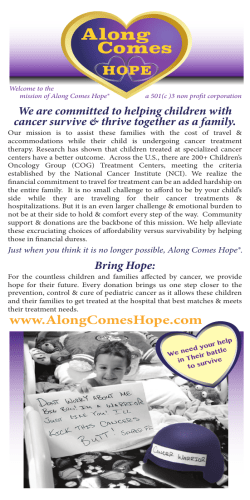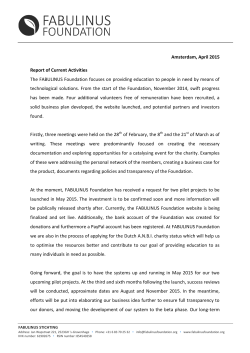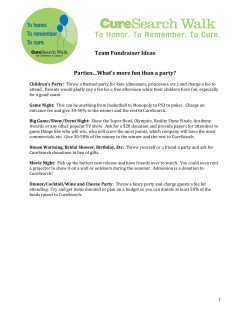
Blood Donor Qualifications Ready, Set, Donate!
Blood Donor Qualifications Ready, Set, Donate! Donors have told us they would like to get through the donation process faster. We are committed to respecting your time while ensuring a safe blood supply for the patients in your community. We’re working on new systems and processes to help speed things up; here’s how you can help: 1. Bring personal identification. We prefer ID that has your picture and full name. Some acceptable forms of ID include: driver’s license, work or school ID (with picture and full name), or passport. Bringing along your Blood Donor Card will help get you through the registration process quickly. If you don’t have one, please ask our staff to order one for you. 2. Bring a list of all countries (and cities/areas) you have visited (with dates) in the past 12 months and do the same for all European countries you’ve visited since 1980. To help, we have included a form (on page 2) for you to complete before your next donation. Please be sure to update this list every time you travel and verify every time you donate. 3. Wear a top with loose-fitting sleeves (preferably short sleeves) so that we can check your blood pressure and locate the best vein to use to collect your blood. 4. Make an appointment. We make every attempt to take donors with appointments before walk-ins. To schedule your lifesaving appointment, visit our website. Basic Qualifications Age: 16 or older for whole blood or apheresis donations (parental permission is required for all 16-year-old donors and, in some states, for 17-year-old donors.) Weight: At least 110 pounds (50 kg) There are some weight and height restrictions for donors younger than 23. See chart below. Waiting period between donations:1 • Whole blood or red cell/plasma donations: 56 days (up to 6x/12 months) • Plasma donations: 28 days • Double red cell donations: 112 days (up to 3x/12 months) • Platelet donations: 7 days (up to 24x/12 months) 1 If you have any questions about the number of donations you can make in a 12-month period, please talk with our staff. Height/Weight Restrictions for Donors Age 16-22 Eligibility is Based on Estimated Total Blood Volume Males between 16 and 22: You must be at least 5' tall and weigh at least 110 pounds. Females between 16 and 22: If you weigh at least 110 but are shorter than 5'6", please refer to this chart.2 Females who are: ≥ 4'10" ≥ 4'11" ≥ 5' ≥ 5'1" ≥ 5'2" ≥ 5'3" ≥ 5'4" Must weigh: ≥ 146 ≥ 142 ≥ 138 ≥ 133 ≥ 129 ≥ 124 ≥ 120 2 Shorter people must weigh more to achieve a 3500 mL blood volume. Please see page 2 for additional qualifications, our medications list, and other important information. Thanks for finding the hero in you! Together we can make your donation safe, fun, and as quick as possible. BS 300L (Rev. 10) ≥ 5'5" ≥ 115 We Ask You Not to Donate if You: • • • • • Have cold or flu symptoms or do not feel well on the day of donation. Had hepatitis after your 11th birthday. Have had close contact with someone with clinical hepatitis within the past 12 months. Have a history of cancer in the past year (except some skin or in situ cancers). Had a blood transfusion, ear/skin piercing3, acupuncture3, accidental needlestick, or come in contact with someone else’s blood in the past 12 months. (3 Ear/skin piercing and acupuncture procedures may be acceptable depending the technique used.) • Are donating at Blood Centers of the Pacific and have had a tattoo in the past 12 months. • At United Blood Services locations, tattoos may be acceptable if done at a regulated business in an approved state. Contact your local center for a list of approved states. • Had malaria in the past or traveled to a malarial risk area in the past 12 months. • Are or have been pregnant in the past 6 weeks. • Have been treated for syphilis or gonorrhea in the past 12 months. • Have used a needle to inject drugs not prescribed for you (including steroids). • Are at risk for exposure to HIV, the virus that causes AIDS. I f you take medication, you probably are eligible to donate. Here is a list of medications that may keep you from donating for a period of time. Medication Waiting Time Antibiotic or other medication for infection Proscar, Propecia, finasteride, Accutane, isotretinoin, Absorica, Amnesteem, Claravis, Sotret Avodart, dutasteride, Arava, leflunomide Blood transfusion, unlicensed vaccine, or hepatitis B immune globulin injection given to treat an exposure to hepatitis B (this is not hepatitis B vaccine) Soriatane, acitretin Tegison, etretinate, growth hormone from human pituitary glands, bovine or beef insulin, clotting factor concentrates Until you finish taking the last dose and have no symptoms of infection One month since last dose Six months since last dose One year since last dose Three years since last dose May not donate blood Please List Your Travel Travel to Europe since 1980: Albania, Andorra, Austria, Azores (Portugal), Belgium, Bosnia-Herzegovina, Bulgaria, Canary Islands (Spain), Ceuta (Spain), Croatia, Czech Republic, Denmark, Finland, France, French Guiana (France), Germany, Greece, Guadeloupe (France), Hungary, Ireland (Republic of Ireland), Isla de Alboran (Spain), Islas Chafarinas (Spain), Italy, Liechtenstein, Luxembourg, Macedonia, Martinique (France), Mayotte (France), Melilla (Spain), Monaco, Netherlands, Norway, Penon de Alhucemas (Spain), Penon de Velez de la Gomera (Spain), Poland, Portugal, Reunion (France), Romania, San Marino, Serbia, Slovak Republic (Slovakia), Slovenia, Spain, Sweden, Switzerland, Turkey (only if you were associated with a military base there), United Kingdom (including England, Northern Ireland, Scotland, Wales, the Isle of Man, the Channel Islands, Gibraltar, and the Falkland Islands), Vatican City, and Federal Republic of Yugoslavia. European Country Dates of Arrival and Departure Length of Stay Other Travel Outside US (past 12 months): Country (include areas/regions & cities) Date of Departure from That Country
© Copyright 2026











